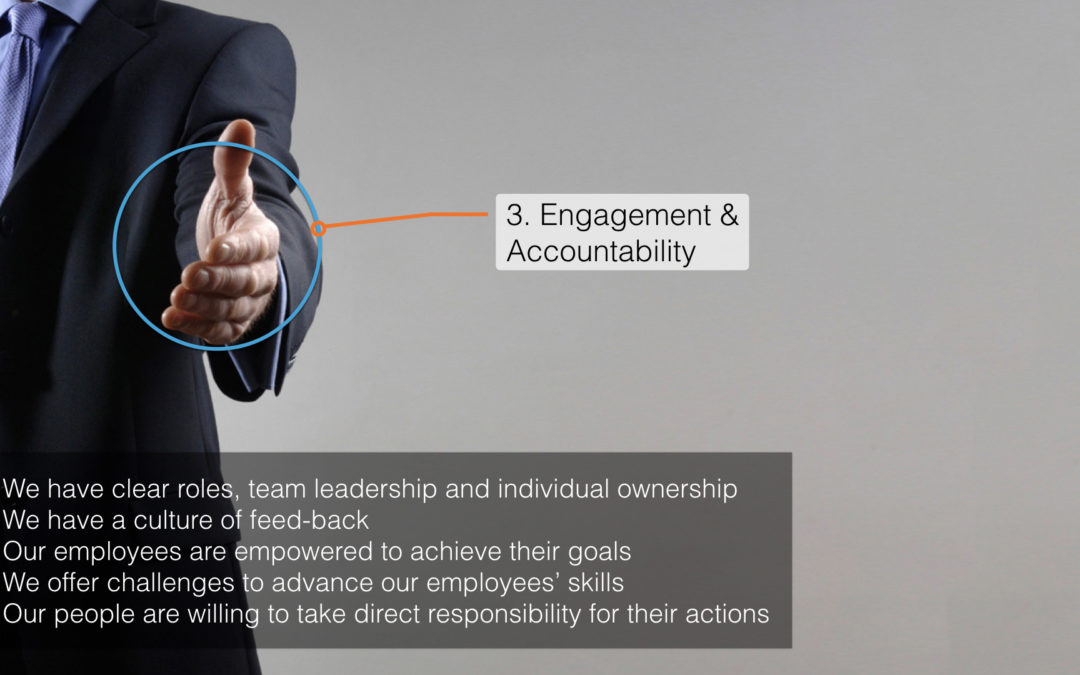According to Benjamin Chaminade, creativity is a four-stage process. The first stage is ‘inspiration’. Therefore, rather than swamp you with different viewpoints and theories, we have decided instead to give you some concrete examples of management innovation practices that have been adopted by companies of different sizes, activities and nationalities. They all have one thing in common: they have succeeded in combining self-fulfilment and performance.
Here are a few innovative practices, ranked in order of importance according to French companies (trust, commitment, wellbeing, agility, collaboration and creativity).
Engagement and Accountability
“The best executive is one who has sense enough to pick good people to do what he wants done, and enough self-restraint to keep from meddling with them while they do it” - T. Roosevelt
“It’s not my job”, “I’m not paid to do that”, “I told you it wouldn’t work”, “It’s the accounts department’s fault”…… So many sentiments that serve no purpose whatsoever except to undermine those managers who fail to understand why their staff are not as invested in their work as they are.
Does professional consciousness belong in the past?
According to an international Gallup survey, about 11% of employees describe themselves as ‘committed’ (motivated, willing), 61% as ‘uncommitted’ (they just do what they’re told) and 28% as ‘actively disengaged’ (these people have a very negative view of the company they work for and may even go against the company’s interests if necessary). These figures have changed very little in the past 10 years.
A sense of responsibility goes hand in hand with commitment. In other words, I feel responsible for what I have decided, not for what has been decided for me. The truth of the matter is, it’s actually very rare for staff to have the freedom to make their own decisions about their aims and objectives. Rather they are tasked with thinking about ‘how’ they might achieve them rather than ‘what’ they are (they are usually pre-defined by managers).
As long as employees have no say in defining what is asked of them, our management systems will remain at the undeveloped end of the scale. Managers, like good fathers, will continue to reward success and punish failures, non-compliance and professional shortcomings, whether that be by withholding rewards or implementing some kind of sanctions or punishment.
And it’s precisely this fear of being ‘punished’ that hinders accountability. The ‘sword of Damocles’ is all too often a source of tension between managers and employees. The ‘zero failure’ and ‘100% quality’ cultures we are trying to create are the very things which are putting employees on the defensive (it’s not my fault!). Whereas if we were to value mistakes (providing they weren’t purposeful or repeated) we could instil a culture of continuous improvement (provided a climate of confidence had been created prior to this).
Three examples of how you might strengthen commitment and empowerment.
- In France, at Leroy Merlin(a French DIY retailer), a commitment and empowerment strategy was developed through several employee-led meetings, and integrated into what is known as the ‘Vision’ approach.At the start of this project all employees contributed to the development of this company strategy where ‘it’s good to work’. Each and every employee had a part to play in bringing it to fruition. Maybe the fact that all employees are shareholders in the company (with profits distributed equally) is a contributory factor to this notion of employee commitment and empowerment?
- At Morning Star, in the United States, the world’s leading tomatoingredient processing company, with nearly 700 employees, individual members of staff negotiate their own objectives with their colleagues, based on their respective ideas and what they feel would be good for the company. There is no manager telling them what to do. These negotiations result in a kind of ‘personal mission statement’ or ‘Colleague Letter of Understanding’ (CLOU), which is accessible to all staff. This practice differs from the more traditional ‘objective setting’ as the people writing the objectives are the very people who will be responsible for achieving them.
- A few years ago, in France, the airline, Air France, unveiled a ‘no punishment’ charter.After the realisation that human error was one of the principle causes of accidents and incidents, and after reviewing the consequences, the airline started to encourage staff to admit their mistakes (anonymously) and to report any malfunctions. In return Air France committed to not impose any ‘punishment’. Penalties would only be imposed on those employees who did not own up to their mistakes.



Thank you for the sensible critique. Me & my neighbor were just preparing to do a little research on this. We got a grab a book from our area library but I think I learned more from this post. I’m very glad to see such magnificent info being shared freely out there.